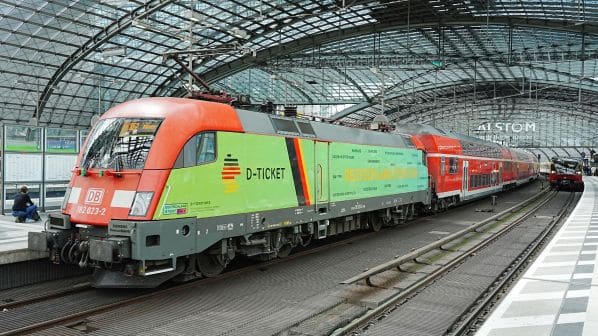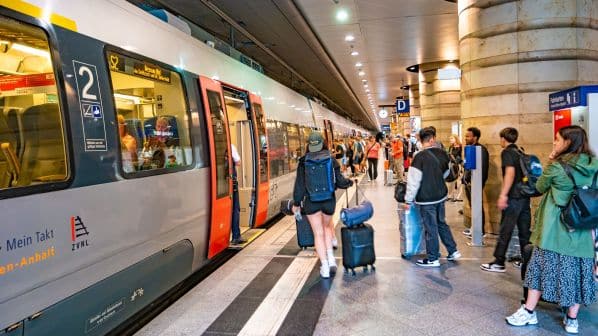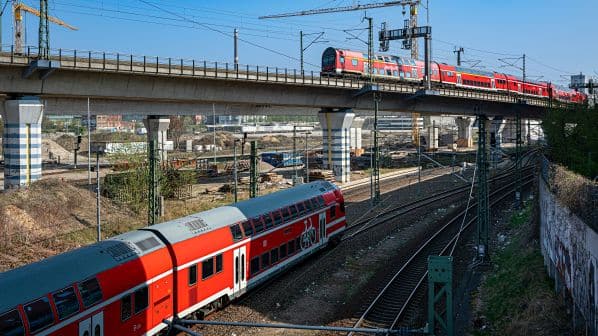OPERATING profit or adjusted Ebit at the German Rail (DB) Group in the first half of 2023 was €331m, over €500m or 62% down on the first six months of 2022, which DB says is due in part to higher upfront costs for infrastructure work including maintenance and upgrades.
In a “difficult” economic climate combining ongoing inflation with falling rates on international freight markets, adjusted revenue at DB Group was €25bn in the first half of 2023, down from €28bn the year before.
This was despite double-digit growth in passenger traffic in DB’s home market, which contributed to revenue increasing at all units within the Integrated Rail System, DB’s core business in Europe, and in some cases by a considerable margin, according to DB.
Growing passenger demand has been driven in part by the introduction of the Deutschlandticket, which offers unlimited travel on regional and local public transport across Germany for €49 a month. DB’s Long Distance services are excluded.
A total of 11 million Deutschlandtickets were sold in the two months after sales began on April 4, ahead of the new ticket becoming valid for travel from May 1.
DB says that over 808 million passengers travelled on regional trains in Germany in the first half of 2023, 11.5% up on the year before. DB Long Distance passenger numbers were 15.4% up on the year before at 68 million.
Indeed, passenger-km in the first half of 2023 at DB Long Distance were 21.7 billion, far exceeding the 2022 figure of 18.3 billion and beating the previous first-half record set in 2019. Operating profit at DB Long Distance improved by more than €130m in the first half of 2023.
DB Cargo continued to make losses, suffering from a worsening competitive environment for rail freight, traction electricity prices that were much higher than those for diesel fuel, and a less dynamic market.
Overall, the Integrated Rail System posted an operating loss of €339m the first half of 2023, due mainly to higher spending on infrastructure upgrades and maintenance at DB Network.
DB says that work to modernise the railway network in now being undertaken at record levels throughout Germany, which caused the punctuality of long-distance passenger services to fall from 69.6% in the first of half of 2022 to 68.7% in the first half of this year.

“Despite the difficult financial situation, we greatly increased our spending to provide better infrastructure,” says DB CFO, Dr Levin Holle.
“This will be a one-time injection until the increased funding from the federal government that has been announced takes effect next year."
DB increased net capital expenditure from its own funds by 13.1% to €3.1bn in the first six months of 2023, which it says is the largest amount ever invested in a first half.
Gross capital expenditure by DB and the federal government was up 16.7% at €6.3bn, also a record according to DB. “More than 90% of all funding has continued to go towards rail operations in Germany, including for track, stations and new trains,” it says.
“We need to be more productive and more efficient in all areas to secure our investment in the future,” Holle says, pointing to the need to offset additional expenses with higher productivity and higher income. Staff costs will increase as upcoming collective bargaining agreements are concluded.
Rates in the global air and maritime freight markets are now returning to normal from the high levels that helped DB’s logistics subsidiary, DB Schenker, record the largest profit in its history in 2022.
Nevertheless, DB Schenker reported a “significant” operating profit of €626m in the first half of 2023 and its positive contribution to the DB Group bottom line was nearly three times higher than before the Covid-19 pandemic.
As it warned when announcing its 2022 results in March, DB Group is still expecting to make a significant operating loss in 2023 as whole, but lower than original forecasts at “slightly less than €1bn.”
Full-year DB Group revenue is likely to be around €51bn, but DB warns that all forecasts are dependent on further developments and are subject to a high level of uncertainty.
Commenting on DB’s rising passenger traffic, Lutz says “we aren't even close to tapping the full potential for demand.”
“The support for rail shows us that continuing to invest in more climate-friendly rail transport is crucial, even in challenging times. At the same time, we are committed to increasing our profitability.”




